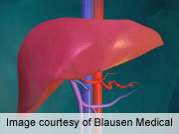(HealthDay)—For patients with chronic liver disease, hepatocellular carcinoma (HCC) screening can identify patients at an earlier stage, but the benefits and harms of screening are unclear, according to a study published online June 16 in the Annals of Internal Medicine.
Devan Kansagara, M.D., from the Portland Veterans Affairs Medical Center in Oregon, and colleagues conducted a systematic literature review to examine the benefits and harms of routine screening for HCC in patients with chronic liver disease. Twenty-two studies met the inclusion criteria.
The researchers found that evidence of the effects of screening was very low strength. Based on one large trial, periodic ultrasonographic screening correlated with decreased HCC mortality (rate ratio, 0.63), but methodological flaws limited the study. No survival benefit was seen with periodic α-fetoprotein screening in a trial involving patients with hepatitis B. Based on 18 observational studies, patients that underwent screening had earlier-stage HCC than patients who were diagnosed clinically, but the effects were confounded by lead- and length-time. No survival differences were found for shorter (three- to four-month) and longer (six- to 12-month) screening intervals, based on two trials. Screening harms were poorly studied.
"Screening tests can identify early-stage HCC, but whether systematic screening leads to a survival advantage over clinical diagnosis is uncertain," the authors write.
More information:
Abstract
Full Text
Editorial
Journal information: Annals of Internal Medicine
Copyright © 2014 HealthDay. All rights reserved.





















